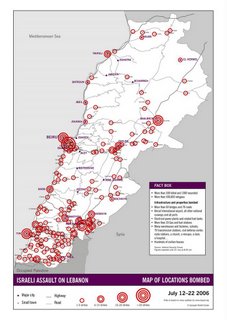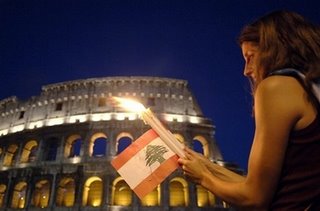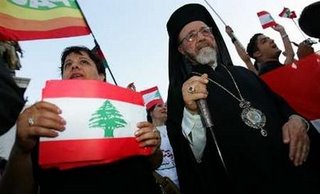Map of Israeli assault on Lebanon
 That's what As'ad Abu Khalil wrote on his blog. I often disagree with him, but this analysis is commendable and I am copying it entirely:
That's what As'ad Abu Khalil wrote on his blog. I often disagree with him, but this analysis is commendable and I am copying it entirely:Israel's False Assumptions about Lebanon: Israeli Miscalculations. At this stage, it is not clear what will happen next. But at this stage, it is possible to state that Israeli political goals will not be achieved, no matter how long Israeli aggression takes. No matter what happens next, and even if Israel manages to kill Nasrallah or other leaders, Israel's ability to achieve its goals is diminishing not increasing. I am not being triumphalist: Israeli military superiority, and Israeli willingness, nay eagerness, to use massive and indiscriminate violence, has never been in doubt. I lived and barely survived the 1982 Israeli invasion after all. But the political situation is rather spiraling quickly away from the intentions of Israel and its vocal and silent partners in the world. Just today, I watched an appearance by Mustafa Al-Faqi (chairperson of the Egyptian parliamentary Foreign Relations Committee). He spoke like a Hizbullah spokesperson. A Hizbullah guest on the show (Lebanese member of parliament Husayn Hajj Hasan who is such an ineffective propagandist for the party) noted that tone and that change, even from a few days ago. Here is my list of Israeli miscalculations:One thing I may add is the poor performance of the Israeli intelligence: they hit aims and structures not related with Hezbollah while at the same time not being able to target real paramilitary structures of Hezbollah across the border in Southern Lebanon.
1) Arab governments--as usual--did not dare go as far as the Israel wanted. Just as Bashir Gemayyel did not fulfill his promises to the Israelis in 1982. To be sure, House of Saud, Jordan's Hashemites, Kuwait royal family, and Egypt's Mubarak all covered up for Israel in the Arab League. But the famous statement by the House of Saud did not even have a source or name attached to it. It was attributed to an "official." No house of Saud member dared to sign his/her [her? in Saudi Arabia where women still can't drive] name to it. And also notice the way the Arab official rhetoric and media have been changing. NOT out of concern for victims of Israeli bombings, but out of fear of public opinion.
2) Israel assumed that Hizbullah fighters would flee within one day as was the case in 1982.
3) Israel assumed Shi`ite refugees would break with Hizbullah. The opposite happened. Amal people just joined Hizbullah, politically and otherwise. And NOT A SINGLE SHI`ITE politician (like Hariri Inc's deputies Ghazi Yusuf or Basim As-Sab`) said a word--not a word, either way. And many callers to Lebanese TV news shows mention their names in rage, particularly in the case of Ghazi Yusuf who attended the Lebanese Forces' honoring of John Bolton 2 months ago. Yusuf has not stepped foot in Lebanon in a while now, and I doubt that he will return soon. He tried to get Muhammad Husayn Fadlallah to help him but the latter told him that Shi`ite opinion is most angry at him. Basim As-Sab` also has not stepped foot in Lebanon in months. These were the "moderate" Shi`ites that Walid Jumblat invokes as "alternative" to Hizbullah. Israel assumed that anti-Hizbullah Shi`ites would strengthen their resolve against the party. The opposite occurred.
4) Israel assumed that the mood of the Shi`ites in South Lebanon in 1982 would be replicated now. Back then: people just raised the white flags, and some even welcomed the invading Israeli troops, before turning against them in one year, due to your typical savagery of Israeli occupation methods and techniques. Furthermore, Hizbullah seems to have learned from PLO experience: they remained invisible, and thus did not create a thuggish rule that Israel would later exploit in its favor. People of South Lebanon were not looking for a "rescuer" this time around. But they now want a rescuer from Israeli aggression NOW.
5) Israel assumed that Sunni and Druze momentum against Hizbullah--funded by Hariri Inc--would mount and become more vocal. The opposite occurred. The outrage at Israeli brutality seems to have muted voices of criticisms of Hizbullah, even among people who never really cared about Hizbullah, and its fundamentalist ideology.
6) Israel assumed that the Lebanese government would get stronger from the aggression, but it has gotten weaker. Prime Minister Fu'ad Laval has not dared to visit one shelter or refugee center.
7) Israel assumed that this aggression will take a few more days, and that Israeli society would treat this as a victory.
8) Israel assumed that a air bombing would be all what is required, with little harm to Israeli occupation troops.
9) Israel assumed that Hizbullah leaders would simply sit and wait for Israeli bombs in their houses and apartments.
10) Israel assumed that US media would not care about Lebanese civilians. Wait. That was a correct assumption. Sorry.
11) Israel assumed that Arab public would treat the stance of Hizbullah as "adventurist" and "reckless." That would have been a correct assumption if House of Saud speaks on behalf of all Arabs and if Hizbullah fighters did not fight toughly. That is very significant for Arab (including Lebanese) public opinion given the abysmal performance of Arab (and `Arafat's) armies. This is a very important element in Arab political culture, that Hizbullah calculated about, it seems, and Israel had no clue about. This campaign seems to follow the law of diminishing return: the longer it lasts, the more Israel can kill, but the more massive will the devastation be, and the more "heroic"--in public perceptions--will people--in Lebanon and Arab world--treat Hizbullah's stance. Israel may turn this into a further boost for Hizbullah. But then again: Israel always seems to boost its enemies. So the real enemies and opponents of Hizbullah in Lebanon will be more angry at Israel after this for boosting Hizbullah.
12) Israel assumed that Hizbullah would follow past Arab (and `Arafat's PLO) propaganda patterns of bombast and wild exaggeration. Thus far, Hizbullah propaganda and official communiques have been quite restrained and understated. That has helped the public credibility perception of the party in Lebanese and Arab public.
13) Israel (just as in 1982) assumed that its silly flyers over South Lebanon will be seen as witty and smart. Instead; they are seen as dumb and foolish, and badly crafted.
14) Israel assumed that a group of South Lebanese people, perhaps the former SLAs, would be willing to show up publicly to help Israel. That was not to be. Not a single person has done that. In 1982: there were many people (of different religions) who volunteered to cooperate with Israeli occupation in order to--in their minds--rid themselves of PLO rule.
15) Israel assumed that Hizbullah's ability to inflict counter-harm to Israeli cities and towns would be quickly eliminated.
16) Israel assumed that Nasrallah or Hizbullah leaders would crack under pressure. No signs of that whatever.
17) Israel assumed that the displaced people would constitute an automatic lobbying group against Hizbullah. Far from that: they have become a strong lobbying group for Hizbullah.

How you can help Lebanon:
Donate to the Sanayeh Relief Center:
CLIENT NAME: GREENLINE ASSOCIATION
ACCOUNT NMBR: 6189003
BANK: BANK OF KUWAIT AND THE ARAB WORLD
SWIFT: BKAWLBBE
Greenline Association address:
3rd floor, Yamout building, Spears 174,
Sanayeh, Beirut, Lebanon
Telefax: (+961 1) 746 215 or (+961 1) 752 142
E-mail greenline@greenline.org.lb
For more information, please contact:
+961 3 647 605
+961 3 670 783
sanayeh.center@gmail.com
In Italia è possibile versare un contributo (con detrazione fiscale) mediante bonifico bancario sul c/c 99169
presso la Banca di Bergamo-Credito Varesino (piazza Vittorio Veneto, 8 -- Bergamo)
ABI 5428
CAB 11101
intestato ad Associazione Diakonia Onlus
indicando la causale "Emergenza Medio Oriente 2006".












2 Comments:
OK, I kept your comments - let's see how would you keep mine.
I need to search for stats on Katjushas from WW2 - or somebody can have that already. I do not remember how many did they kill, but I am sure it was more then 1 person per missile.
It is a no-brainer, Katjushas were used en-masse in WW2, and there is enough information on any weapon used. BTW, GRAD B-26 that Hezb uses is much improved version of B-13 Katjusha, and Russians were using them on entrenched troops, not on civilians going about their business.
Make your own mind how many did 16,000 Hezb missiles were going to kill, but it would be much more then 16,000 people. IDF is preventing that, killing about 300 people in process, some of them active agressors, others citizens of the country that attacked.
Again - they caused deeply unfortunate deaths of approximately 200 civilians by striking attackers to save 16,000 civilians or more. IDF, you are the best this planet has.
Blame this war on those who started it. On those who were too cowardish to disarm Hezbullah. Who openly declared that they "have no intention to save Israelis form Hezbullah missiles"
Thanks for leaving your comment, although I have to disagree with you on several points.
1. It is false to state that Lebanon was "the country who attacked". The whole series of events was triggered by the kidnapping by Hezbollah (not the Lebanese Army) of two IDF soldiers. It is important to keep distinct the role and responsibilities of Hezbollah from the role and responsibilites of the Lebanese government.
2. The disarmament of Hezbollah had been a topic of the "National Dialogue" talks that started last February and which gathered all the main political leaders of all confessional denominations of Lebanon for the first time in decades. Given the delicate political and economic circumstances of Lebanese, the implementation of UN 1559 was going to be a very slow process. No instant solutions, I'm afraid. But it might have proven more substantial in the long term than the shelling of residential neighborhoods.
3. The same Lebanese cabinet that you are criticizing was cheerfully hailed only one year ago by the Bush admnistration and the US media as the result of the "democratic" "Cedar Revolution" and the end of the Syrian tutelage over Lebanon. Now it's become cowardish and terrorist-friendly. Sic transit gloria mundi!
4. The argument that "people voted for Hezbollah" is indeed very weak.
On one hand, certainly not all the Lebanese voted for Hezbollah, while the whole country (regardless of political preferences) is being targeted now.
On the other hand, people in Northern Ireland voted for Sinn Fein, which was at the time the political wing of IRA, a group that perpetrated terrorist attacks in the UK every now and then (including dozens of victims in the London underground in 1987). I don't recall that any British politician ever called for the shelling of the whole of Northern Ireland on the grounds that some people there had voted for "the terrorists" or supported them. Nor was the Spanish government advocating an indiscriminate bombing of the entire Euskadi/Basque Country because some people there had voted for Batasuna, which is linked to ETA. Oh wait. Someone did bomb a Basque town because it was the believed to support Basque rebels. The guy was Francisco Franco and the town's name was Gernika. That gives me shivers.
5. Let's assume the claim Hezbollah had 16,000 missiles is correct and verified. There's a concept in military studies called "deterrence", such as in the Cuban Missile Crisis events: you stockpile weapons not for immediate use but as a show of military might, in order to deter (prevent) attacks or to threaten retaliation if attacked. There are many qualified academic works on deterrence theories and brinkmanship. I suggest you read some of them.
Suggesting that all those 16,000 missiles were ready to be launched at once to kill 16,000 civilians is only a spin, and not even a convicing one.
6. The very basic point that you keep eluding is IF and HOW these military operations will create conditions of enhanced stability and peace or whether they will increase violence and threats on both sides. I believe the latter. It looks like the IDF are surprised by the resistence offered by Hezbollah and are increasingly concerned that an overland attack would result in a number of Israeli military casualties higher than expected. In fact, the Israeli government hasn't ruled out the deployment of an international force on the Lebanese-Israeli border. Indeed, a number of countries have offered to participate in this multinational effort. Well, except the US, probably.
7. On the Lebanese domestic level, as many articles and analyses suggest, the Israeli attacks are strengthening the position of Nasrallah and the likes, not the other way round. Cheers guys, you're doing a brilliant job!
8. One final consideration on the moral side, which is never marginal. I believe that the dignity of each human person is always the same, regardless of religious persuasion, ethnic background, nationality, occupation, income level, gender, sexual orientation or anything else. So I guess we could affirm that the life of a Israeli person is more or less worth the life of a Lebanese person (and vice versa).
I am not interested in the arithmetic of victims or in the discrimination between "good" civilian victims and "evil" ones. The death of civilians (of any side) should always arouse our sorrow.
Post a Comment
<< Home